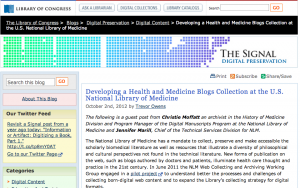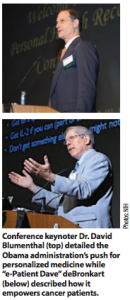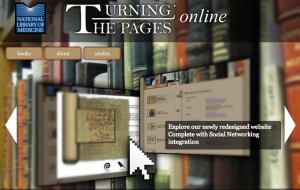 How do you know when an idea is taking root? It’s a question I constantly ask, in both my inside and outside voices, as I travel around banging the drum for listening to patients as a worthy voice in healthcare. Well, this month I got a piece of news that blew my mind so much that it’s taken me two weeks to decide what to say:
How do you know when an idea is taking root? It’s a question I constantly ask, in both my inside and outside voices, as I travel around banging the drum for listening to patients as a worthy voice in healthcare. Well, this month I got a piece of news that blew my mind so much that it’s taken me two weeks to decide what to say:
This blog is now being archived by the National Library of Medicine. In their History of Medicine Division.
Their post about it is here. Quote:
The National Library of Medicine has a mandate to collect, preserve and make accessible the scholarly biomedical literature as well as resources that illustrate a diversity of philosophical and cultural perspectives not found in the technical literature. New forms of publication on the web, such as blogs authored by doctors and patients, illuminate health care thought and practice in the 21st century. (Emphasis added.)
… NLM has collected the following examples:
And guess who’s listed first:
e-Patient Dave
…a cancer patient and blogger who has become a noted activist for healthcare transformation through participatory medicine and personal health data rights. Mr. deBronkart writes in this post as a newly diagnosed skin cancer patient who is taking action to make his treatment most cost-effective. …

Wow. I mean, I spoke at the “The Library” (as they call it) in April 2010, at their e‑Patient Day (right), and that felt like the movement was being legitimized – but it’s one thing to have a conference, and another entirely to say “Okay, we’re recording this.”
 Did you know the National Library of Medicine is the world’s largest medical library? Did you know they capture all the medical journals there, paper and online? (It’s a BIG place.) Did you know they have an extraordinary “Turning the Pages Online” project (left), to let you and me and your kids and everyone view rare medical manuscripts online – including an iPad app?
Did you know the National Library of Medicine is the world’s largest medical library? Did you know they capture all the medical journals there, paper and online? (It’s a BIG place.) Did you know they have an extraordinary “Turning the Pages Online” project (left), to let you and me and your kids and everyone view rare medical manuscripts online – including an iPad app?
So – imagine two weeks ago, before I spoke at the Midwest Chapter of the Medical Library Association, when another speaker approached me and introduced himself as Dr. Jeffrey Reznick, the chief of the Division of History of Medicine at the National Library of Medicine. Then he said, “It’s such an honor to meet you,” he said. “Did you know we’ve begun capturing your blog into the Library?”
Thud. No, I did not know that. Thank you, sir.
The impact of this:
Culture change is hard, especially in a rigorous academic field like medicine. Time after time clinicians have told me how they’re trained, even disciplined, to stick to what’s approved by the establishment. This has been one of the challenges of the “let patients help” movement – the message has to be crafted in a way that shines a light on what’s newly possible, without being inappropriately anti-establishment.
For that reason, virtually every one of my talks quotes Dr. Donald Lindberg, Director of the Library, saying that if he read two journal articles every night, at the end of a year he’d be 400 years behind: nobody can keep up. The implication is, “Hey, look – the top guy says it’s no failure if a less trained person has seen something you haven’t.”
Whoever at The Library decided to track blogs, and whoever decided to include patients, thank you – I guess this means that “patients as a worthy voice” is no longer out of the question. You get it – you get what’s happening as medical knowledge diffuses through the internet.
p.s. Why Medlibs rock:
The audience, that day in Rochester MN, was “medlibs” – medical librarians. I’ve long said that medlibs rock: when Google fails you, turn to a medlib and ask for help. They’re not just better “googlers” – they understand deep ways that knowledge is stored in medical libraries, and can find things that help doctors as well as patients.
And at that event, one thing we realized is that some people don’t want to “bother” a medlib, thinking they must be busy. Well, guess what – some WANT to be bothered. So we started list of volunteers, titled Bother a Medlib Today! How great is that? Here they are – go for it.


Congratulations Dave! I feel so proud of you! your arduous work these two years gets the most official recognition. Yes, there are e-patients and there is an e-patient movement despite what many consider as the “soufragettes” in healthcare. I can’t wait to see you presenting in Athens.
So glad that NLM is capturing your blog for two reasons – your words get out and NLM, a strong advocate for consumer health information, gets to help spread that word.
And thank you for the shout-out to medlibs. MOST medlibs want to be “bothered”. Really. Maybe the motto should be just “Bother a Medlib today.”
BTW – our hospital has a program where health care professionals (physicians, nurses, social workers, etc) can refer a patient to a librarian. Our librarians get the request & go to the room and talk with the patient and/or their family. Then, the librarian puts together a packet of information to help answer their questions. Very cool. Patients can also contact us independently.
I would encourage all patients to ask if there’s a medical librarian…we really do want to be “bothered.”
Thanks for your continued advocacy on behalf of all us patients. And all us medlibs.
> our hospital has a program where health care professionals can refer a patient to a librarian.
HOT DANG! Hey MLA, get on that – make that the norm!
Donna, what’s yer hospital?? Kudos!
I’m a librarian at Miner Library – University of Rochester Medical Center in Rochester, NY.
As a medical translator, I often need to look up information in French or Spanish. Can you refer me to medical librarians who are familiar with publications in one of those languages and who would be willing to help me find corresponding terminology in English from time to time?
Thanks.
Bonjour Janet, a great tool for translating medical terminology from English to French (and vice-versa) is the Portail Terminologique de Santé, which includes MeSH translations.
Hi Janet,
If you are looking up patient education information in multiple languages I highly recommend MedlinePlus en espanol and other languages are available there too.
Librarians do not usually translate terminology from journal or other publications since full context is critical, although touching base with one of the advisors for HLWIKI to see who they recommend connecting with may be helpful.
Hi, Janet,
I know that more than a month has gone by but I am giving it a go. Try these websites for patient education materials in multiple languages:
Ethnomed http://ethnomed.org
Ethnic and medical information pertinent to immigrant and refugee groups from the University of Washington.
EurasiaHealth http://www.eurasiahealth.org
An online library of multilingual health resources with a focus on Central & Eastern Europe.
MedlinePlus in Multiple Languages http://www.nlm.nih.gov/medlineplus/languages/languages.html
Patient information from the National Library of Medicine.
MedlinePlus in Spanish http://www.nlm.nih.gov/medlineplus/spanish/
Patient information from the National Library of Medicine.
Polyglot Multimedia Medical Spanish & Translator http://polyglot.topsailmultimedia.com/polyglot.html
Multimedia phrase book and sample conversation guide from Duke University AHEC program.
Refugee Health Information Network http://rhin.org/
Multilingual health information for refugees and their health care providers from the National Library of Medicine.
SPIRAL http://spiral.tufts.edu/index.php
Selected patient information resources in Asian languages from Tufts University.
Thank you, Margot!